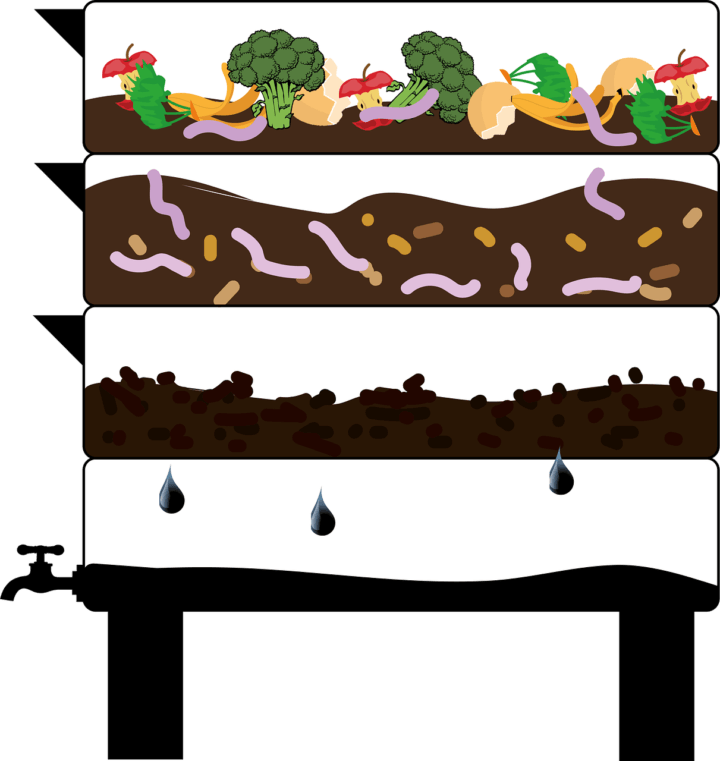Embracing a zero-waste lifestyle is a commitment to sustainable living where every action and decision aims to minimize environmental impact. One of the most effective ways to achieve this is through composting. By turning your kitchen scraps and yard waste into nutrient-rich soil, you’re not only reducing the amount of waste sent to landfills, but you are also creating a valuable resource that can help your garden thrive.

Composting is a simple yet profound method to contribute positively to our environment right from home. It involves a natural process where organic material is broken down into a soil-like substance, teeming with beneficial microorganisms. This activity not only helps you manage household food waste responsibly but also provides an alternative to chemical fertilizers, promoting healthier plant growth and restoring vitality to depleted soil.
Table of Contents
Key Takeaways
- Composting significantly reduces landfill waste and greenhouse gas emissions.
- It enriches the soil, aiding in water retention and plant nutrition.
- Embracing composting is a key step in living a zero-waste lifestyle.
- Selecting appropriate materials such as food scraps, yard trimmings, and cardboard is essential.
- Composting is a cost-effective way to create a valuable resource for gardening and agriculture, regardless of scale.
- When shopping, consider selecting products with minimal packaging or opt for items made from recyclable or compostable materials.
- Composted material is beneficial as a soil amendment due to its high nutrient and organic matter content.
- Practicing a zero-waste lifestyle can offer numerous benefits to the environment, local economies, and communities.
The Essentials of Composting
Kickstarting your journey to a zero waste lifestyle, let’s break down the essentials of composting. This process is not just about throwing leftovers in a pile; it’s a deliberate method to transform your organic waste into a nutrient powerhouse for your garden, promoting a more sustainable way of living.
Understanding Composting
Composting is like nature’s own recycling plan—you’re taking your kitchen scraps and yard waste and giving them a second life. Microorganisms break down organic material into a nutrient-rich soil additive, known as compost. Think of compost as a soil superhero; it enriches the ground, helping to foster plant growth and restore vitality to depleted soil.
Benefits of Sustainable Waste Management
Your food scraps and lawn trimmings can be more than just waste. By composting, you reduce the amount of garbage heading to landfills and minimize methane emissions.
It’s a sustainable loop: your organic waste nourishes the earth, which in turn grows more food. Moreover, composting can save on disposal costs as you’re creating less trash overall.
Composting Methods
You’ve got options when it comes to breaking down your organic leftovers.
- Home Composting: It’s the DIY of waste management. You can simply start a pile or bin where you layer your organic waste and let nature do its thing.
- Hot Composting: This method speeds up the decomposition process by carefully managing moisture, air, and temperature.
- Vermicomposting: If you aren’t squeamish, worms can be your allies in breaking down food waste efficiently.
Each composting system has its pros and cons, so choose what fits your lifestyle best.
Key Materials for Composting
To craft your ideal compost concoction, you’ll want a balanced mix of nitrogen-rich materials (like vegetable peelings or coffee grounds) and carbon-rich materials (such as dried leaves or shredded paper). Aim for a ratio of about 1 part nitrogen to 3 parts carbon. A well-tended mixture with the right balance promotes a thriving colony of microorganisms that boosts the breakdown process, leading to higher-quality compost.
Why Compost Matters
You’ve probably heard about composting, but you might not be aware of just how critical it is for a more sustainable lifestyle. It’s about turning your waste into treasure and doing your part in the battle against climate change.
Environmental Impact
When you compost, you’re participating in a natural recycling process that’s hugely beneficial to the environmental health of our planet. Your banana peels and coffee grounds transform into rich, fertile soil that can support plant growth and restore vitality to depleted earth.
This process doesn’t just benefit your garden; it contributes to a larger sustainable effort. Plus, by composting, you’re reducing the need for chemical fertilizers, which can cause substantial pollution in waterways and harm wildlife.
Reduction of Greenhouse Gases
Composting is a hero when it comes to reducing greenhouse gas emissions—especially methane. Typically, when your biodegradable waste ends up in a landfill, it decomposes anaerobically (without oxygen), which creates methane, a potent greenhouse gas.
However, composting allows waste to break down aerobically (with oxygen), producing negligible amounts of methane. By composting, you’re actively helping to reduce greenhouse gas emissions and combat climate change. The composting process also sequesters carbon dioxide, another win for our atmosphere.
Composting in a Zero Waste Lifestyle
Embracing a zero-waste lifestyle involves making conscious choices to reduce waste and sustain natural resources. Composting plays a crucial role in closing the loop of a circular economy.
Advantages of Zero-Waste Commitments
Reduce, reuse, recycle—you’ve heard it countless times, but in a zero-waste lifestyle, these aren’t just suggestions; they’re daily actions. By making compost, you give organic waste a second life, turning what would be trash into a nutrient-rich addition for your garden.
This sustainable practice lessens the burden on landfills and cuts down on methane emissions, a potent greenhouse gas. As you start composting, you contribute to preserving a healthy environment for future generations.
- Environmental Benefits:
- Reduces methane: Diverts organic waste from landfills, cutting greenhouse gas emissions
- Enriches soil: Contributes to healthier plants, reducing the need for chemical fertilizers
- Conserves resources: Lowers the need for water, pesticides, and fertilizers
Integrating Composting Into Daily Life
To integrate composting into your routine, begin with small steps. Learn the composting process, then designate a spot in your kitchen for a compost bin.
Think about your consumption patterns and opt for reusable products to reduce waste further. Remember, mindful consumption is at the very heart of a zero-waste lifestyle. Whether you’re choosing a biodegradable toothbrush or repurposing a glass jar, every choice is a step towards sustainability.
- How to Start:
- Choose a system: Decide whether you want to do backyard composting or collect scraps for a local facility
- Know your scraps: Learn what organic materials can go into your compost pile
- Keep it balanced: Balance greens (vegetable scraps) and browns (dry leaves, paper) for efficient decomposition
Benefits Beyond the Bin
When you commit to composting in pursuit of a zero waste lifestyle, the perks extend beyond just reducing waste in your trash bin. You’re about to see how this eco-friendly habit can touch on social and economic benefits and significantly boost soil and plant health.
Social and Economic Advantages
Composting isn’t just about turning apple cores and potato peels into garden gold. It’s a powerful tool for community building and can even cushion your wallet.
By engaging in composting, you encourage a circular economy—keeping resources in use for as long as possible. For instance, composting programs have been known to supply materials for small-scale zero-waste events and contribute to social initiatives like cap and gown reuse programs.
This not only saves on costs by reducing landfill disposals but also highlights community-centric practices. Plus, it’s easier than you think to get your neighbors on board.
- Creates jobs: Local composting initiatives can lead to job creation, from collection services to facility management.
- Saves money: By reducing your waste, you can see smaller trash bills; some cities even offer compost-related incentives.
Enhancing Soil and Plant Health
Now, your green thumb gets greener when you introduce compost to your garden as a natural fertilizer. It’s because compost is more than just decomposed organic matter—it’s a complete nutrient-packed soil amendment.
Adding compost to your gardens means you are providing your plants with essential nutrients like nitrogen, phosphorus, and potassium, leading to stronger, more resilient plants.
Studies show that compost can improve soil health by enhancing its structure, increasing water retention, and supporting the diverse microbial activity that plants love. Here’s a snapshot:
- Soil structure: Compost has the magic ability to loosen tightly bound particles in clay, allowing for better root growth and water filtration.
- Increased nutrient content: Your plants will thank you for the buffet of essential nutrients that come from rich, crumbly compost.
- Disease suppression: Healthy soil means healthier plants, which translates to a remarkable drop in common plant diseases.
Remember, composting at home can seem like a small gesture, but its impact reaches far and wide.
Frequently Asked Questions

In this section, you’ll find answers to common questions about the role of composting in a zero-waste lifestyle, its benefits, and how to navigate some challenges it presents.
What can I do with the compost from my kitchen scraps?
You can enrich your garden soil by mixing in the compost, which will help your plants grow better. If you don’t have a garden, consider donating the compost to community gardens or neighbors.
How does composting fit into a zero-waste lifestyle?
Composting reduces landfill waste by turning your kitchen scraps and yard waste into nutrient-rich soil. It’s a practical method to minimize your ecological footprint and support sustainability.
What impact does composting have on community health and well-being?
Composting can improve community green spaces and local food production, which in turn can enhance the overall health and well-being of community members by providing fresher air and healthier food options.
What are some challenges associated with composting in urban areas?
Space constraints and lack of access to outdoor areas can make composting a challenge in urban settings. However, innovative solutions like community composting programs can help overcome these hurdles.
How does composting contribute to sustainable waste management?
Composting transforms organic waste into valuable compost, diverting it away from landfills where it would release methane, a potent greenhouse gas. This process supports a more sustainable lifecycle for organic materials.
Can you list some environmental pros and cons of composting?
Certainly! On the plus side, composting reduces greenhouse gases and enriches soil, which can decrease the need for chemical fertilizers. A con could be that improper composting can attract pests and produce odors, but these issues can be managed with good composting practices.
But what does Zero Waste living really mean?
Practicing a Zero Waste lifestyle may present challenges, but by following these tips, you can start to minimize your environmental impact. Composting is a crucial process in waste management, reducing landfill waste and benefiting the environment.
What are some factors and benefits of practicing Zero-Waste Living?
When choosing eco-friendly products, consider factors such as materials used. Opt for products made from renewable and biodegradable materials like bamboo, glass, stainless steel, or organic cotton.
A zero-waste lifestyle involves using more recyclable items such as glass and metals, as well as biodegradable materials, which can help reduce exposure to toxins.
Why should I compost at home?
Various methods of composting, such as curbside pickup in cities, backyard setups, and countertop machines, are helping to create a more sustainable food system and improve accessibility to fresh and healthy food.

